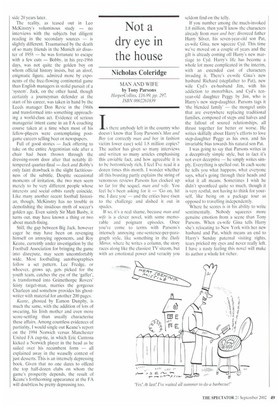Not a dry eye in the house
Nicholas Coleridge
MAN AND WIFE by Tony Parsons HarperCollins; 116,99, pp. 297, ISBN 0002261839 Is there anybody left in the country who doesn't know that Tony Parsons's Man and Boy (or correctly man and boy in fashion victim lower case) sold 1.8 million copies? The author has given so many interviews and written so many articles emphasising this enviable fact, and how agreeable it is to be bottomlessly rich, I feel I've read it a dozen times this month. I wonder whether all this boasting partly explains the string of venomous reviews Parsons has clocked up so far for the sequel, man and wife. You feel he's been asking for it — 'Go on, hit me. I dare you' — and the critics have risen to the challenge and dished it out in spades.
If so, it's a real shame, because man and wife is a clever novel, with some memorable and poignant episodes. Once you've come to terms with Parsons's intensely annoying one-sentence-per-paragraph style, like something in the Daily Mirror, where he writes a column, the story races along like the classiest TV sitcom, but with an emotional power and veracity you seldom find on the telly.
If you number among the much-invoked 1.8 million, then you'll know the characters already from man and boy: divorced father Harry Silver, his seven-year-old son Pat, ex-wife Gina, new squeeze Cyd. This time we've moved on a couple of years and the gilt is already coming off Harry's new marriage to Cyd. Harry's life has become a whole lot more complicated in the interim, with an extended cast of characters invading it. There's ex-wife Gina's new husband Richard (stepfather to Pat), new wife Cyd's ex-husband Jim, with his addiction to motorbikes, and Cyd's tenyear-old daughter Peggy by Jim, who is Harry's new step-daughter. Parsons tags it 'the blended family' — the mongrel units that are everywhere replacing traditional families, composed of steps and halves and the fallout of soured relationships, all thrust together for better or worse. He writes skilfully about Harry's efforts to love step-daughter Peggy as his own, and his invariable bias towards his natural son Pat.
I was going to say that Parsons writes in a deceptively simple style, but in fact it's
not even deceptive he simply writes simply. Everything is spelled out. In each scene he tells you what happens, what everyone says, what's going through their heads and what it all means. Sometimes I wish he didn't spoonfeed quite so much, though it is very restful, not having to think for yourself, like being on a package tour as opposed to travelling independently.
Where he scores is in his ability to write sentimentally. Nobody squeezes more genuine emotion from a scene than Tony Parsons. When ex-wife Gina tells Harry she's relocating to New York with her new husband and Pat, which means an end to Harry's Sunday paternal visiting rights, tears pricked my eyes and never really left. I have a nasty feeling this novel will make its author a whole lot richer.










































































 Previous page
Previous page